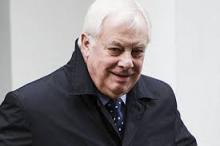The Looming China-Japan Face-Off
LONDON – I am an adviser to the Praemium Imperiale, a prestigious award established under the patronage of the Japanese imperial family to commemorate the centennial of the Japan Art Association’s establishment in the middle of the Meiji period. Since its inception in 1988, the award has been likened to a Nobel Prize for artistic fields such as painting, sculpture, and film.
Following this year’s ceremonies, I visited the foothills of Mount Fuji, whose snow-capped peak is occasionally visible from Tokyo. At this time of year, this region offers another breathtaking sight, as the slopes beneath the mountain’s summit are blanketed with fields of pampas grass that sway and rustle in the wind. It is one of Japan’s most famous tourist attractions.
During my visit, the peaceful rustling of the grass was occasionally interrupted by the distant echoes of gunfire. It would not have felt out of place in Gaza and Ukraine. But what I heard was artillery and tank fire from a nearby training facility of the Japan Self-Defense Forces.
This incident underscored Japan’s historic security policy shift. Under the leadership of the late Abe Shinzō, Japan began to move away from its postwar pacifism and embraced rearmament. This reorientation accelerated under Abe’s successors, Yoshihide Suga and current Prime Minister Fumio Kishida, with Kishida unveiling a plan to double defense spending to 2% of GDP within the next five years.
To be sure, Japan has long been aware of its dangerous geopolitical neighborhood. Over the years, it has positioned itself as a key ally of the world’s liberal democracies. As then-Prime Minister Yasuhiro Nakasone famously put it in the early 1980s, Japan considered itself an “unsinkable aircraft carrier” committed to supporting the United States and other democratic countries against the Soviet threat.
Japan’s move toward rearmament highlights its pivotal role in maintaining stability in the Indo-Pacific and defending the postwar international order. Alarmed by China’s growing geopolitical aspirations, particularly toward Taiwan, Japan has sought to deepen defense ties with other democratic countries in the region such as India, Australia, and New Zealand.
As Japan assumes a more central strategic role in the region, it is also finally breaking free from two decades of economic malaise. The collapse of Japan’s asset bubble in the early 1990s led to a quarter-century of stagnation and deflation, leading many to believe that the country had lost its mojo. But “Abenomics,” the series of reforms championed by Abe, together with the proactive policies of former Bank of Japan Governor Haruhiko Kuroda, improved competitiveness, unlocked new markets for Japanese goods, and put the economy on the path to recovery.
More important, Japan’s resilience reflects the foundational belief that the state exists to serve its citizens, rather than the other way around. This has enabled the country to implement key reforms and restore confidence, even as it grapples with the significant demographic challenge of an aging population and shrinking workforce.
While Japan’s enduring sense of unity and solidarity has enabled it to pursue sensible economic policies, the Communist Party of China (CPC) has struggled to implement the crucial reforms needed to reverse the country’s ongoing economic slowdown and regain the rapid growth it had taken for granted.
Merging a Leninist dictatorship with a dynamic capitalist economy was never going to be easy. But after Deng Xiaoping took power in 1978 and launched China’s “reform and opening up,” it seemed like the CPC could make this uneasy marriage work.
As the economy grew rapidly, with GDP nearly doubling every decade, Chinese politics showed signs of liberalization. Party bureaucracy faced public scrutiny, intellectual debate flourished in universities and think tanks, and civil-society organizations expressed views that departed from the CPC’s line on a range of issues, from environmental concerns to family policy. Many were lulled into believing that China was on the road to becoming a democracy.
Instead, Xi Jinping’s rise to power in 2012 heralded a radical regression. Rather than simply bolstering China’s one-party system, Xi sought to consolidate one-man rule indefinitely. Recognizing the growing concern within the CPC over its waning influence, he reversed every step toward a more open society and economy, leading to disillusionment and despair among some of China’s most successful entrepreneurs.
With economic growth slowing and job prospects dwindling, younger generations have grown despondent. Nevertheless, Xi has persisted, presiding over a secretive regime characterized by sudden, unexplained high-level sackings. Some observers have described Xi’s rule as “Mao with money.”
Xi undeniably believes in centralized control. But in order to maintain it, he has violated the implicit bargain that the CPC established with the Chinese public: if the people stay out of politics, the Party will stay out of their personal lives. This breach of trust has weakened the country’s economic prospects.
China’s economic slowdown could lead the CPC to embrace a militant form of Chinese nationalism in an effort to maintain public loyalty. This would spell trouble for Taiwan, the Asia-Pacific region as a whole, and China itself in the long run. Given the threat posed by China’s assertiveness, it is no surprise that Japan is increasing its defense budget and that other countries have decided to follow America’s lead and explore ways to support Asia’s liberal democracies.
Although China appears stable at the moment, it is the stability of a country where the state is determined to control every aspect of its citizens’ lives. While such control may be feasible, it will undoubtedly stifle the country’s economic dynamism. By contrast, Japan’s stability is firmly rooted in the belief that an open and free society governed by the rule of law is the best way to foster harmony and shared prosperity.
The difference between China’s and Japan’s economic trajectories raises the question: Can a corrupt Leninist regime outperform a free society? Whatever the answer, China is facing an uphill battle.
Chris Patten, the last British governor of Hong Kong and a former EU commissioner for external affairs, is Chancellor of the University of Oxford and the author of The Hong Kong Diaries (Allen Lane, 2022).
© Project Syndicate 1995–2023
This article is brought to you by Project Syndicate that is a not for profit organization.
Project Syndicate brings original, engaging, and thought-provoking commentaries by esteemed leaders and thinkers from around the world to readers everywhere. By offering incisive perspectives on our changing world from those who are shaping its economics, politics, science, and culture, Project Syndicate has created an unrivalled venue for informed public debate. Please see: www.project-syndicate.org.
Should you want to support Project Syndicate you can do it by using the PayPal icon below. Your donation is paid to Project Syndicate in full after PayPal has deducted its transaction fee. Facts & Arts neither receives information about your donation nor a commission.



















